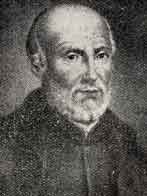Julien Maunoir
Julien Maunoir (born October 1, 1606 in Saint-Georges-de-Reintembault , Département Ille-et-Vilaine , † 1683 in Plévin , Côtes-d'Armor ) was a French Jesuit priest . He is the apostle of Brittany .
Life
Maunoir studied at the college in Rennes and joined the Society of Jesus in 1625 . From 1627 to 1630 he studied philosophy at the Collège Henri-IV de La Flèche and from 1630 to 1633 Greek and Latin at the College of Quimper , then 1633–1634 in Tours and 1634–1638 theology in Bourges . After suffering from blood poisoning, he vowed to devote his life to domestic missions in Brittany, whereupon he was miraculously healed. In 1630 he met Father Michel Le Nobletz (1577–1652) and began to learn Breton . However, he was not interested in the language itself; he only saw it as a tool for converting the locals. He was ordained a priest on June 6, 1637 and spent his three-year novitiate in Rouen .
In 1640 he returned to Quimper and began to preach to the poor in Lower Brittany, succeeding Father Michael Le Nobletz, together with Father Pierre Bernard . He prayed for a day in the Ti Mamm Doue Chapel to the Blessed Virgin for better language skills, and the next day he wrote the first Breton catechism . In 1641 he carried out his first mission in Douarnenez .
Maunoir used pictures and hymns ( cantiques ) to teach the locals about dogmatics , and among other things had the pagan menhir of Saint-Uzec decorated with images of Christ's instruments of passion . He taught most of the French for 42 years, with the assistance of numerous other priests. However, Maunoir insisted that they learn the vernacular, i.e. Breton, so his book "Le Le Sacrè Collège de Jésus, divise en cinq classes" from 1659 also contained a grammar and a Breton dictionary.
Maunoir was also politically active. When in April 1675 the revolt against the paper tax or the torrent over the paper timbre of new royal stamp duties broke out, Maunoir and other Jesuits preached against the insurgents. The rebellion was crushed by the troops of Louis XIV in September 1675 , and the rebels were sentenced to death or to the galleys . Maunoir fought against belief, paganism and black magic.
Maunoir died of pneumonia in Plévin and was buried in the local parish church. Traces of his teaching activity can be traced back to the beginning of the 20th century in Brittany.
He was beatified on May 20, 1951 and was beatified by Pope Pius XII. appointed Protector of Brittany.
Works
- Julien Maunoir, Le Sacrè Collège de Jésus, divise en cinq classes (Quimper 1659).
Afterlife
A school in Saint-George-de-Reintembault is named after Maunoir.
literature
- John Bossy , The Counter-Reformation and the People of Catholic Europe. Past and Present 47, 1970, pp. 51-70.
- Alain Croix, La Bretagne aux 16 e et 17 e siècles: La vie, la mort, la foi. Paris 1981, pp. 1217-18; 1237.
- L. Kerbiriuo, Les Missions bretonnes, histoire de leurs origines mystiques. Brest 1933.
- M.-Th. Le Moign-Klippfel, Le Bienheureux Maunoir: Apôtre des Bretons. Paris: Apostolate des Editions, 1964.
- Ferdinand Renaud, Michel Le Nobletz et les missions bretonnes. Paris: Les Editions du Cèdre, 1954.
- Elizabeth Tingle, The Sacred Space of Julien Maunoir: The Re-Christianizing of the Landscape in Seventeenth-Century Brittany. In: Will Coster / Andrew Spicer (eds.), Sacred Space in Early Modern Europe. Cambridge, Cambridge University Press 2005.
Web links
Individual evidence
- ↑ David A. Bell, Lingua Populi, Lingua Dei: Language, Religion, and the Origins of French Revolutionary Nationalism. American Historical Review 100/5, 1995,1425
- ↑ http://www.college-julien-maunoir.com/
- ↑ David A. Bell, Lingua Populi, Lingua Dei: Language, Religion, and the Origins of French Revolutionary Nationalism. American Historical Review 100/5, 1995, 1425
- ↑ Niall Ó. Ciosáin, Print and Irish, 1570–1900: An Exception among the Celtic Languages? Radharc 5/7, 2004-2006, 96
- ^ TJA Le Goff, DMG Sutherland, The Revolution and the Rural Community in Eighteenth-Century Brittany. Past & Present 62, 1974
- ↑ M.-Th. Le Moign-Klippfel, Le Bienheureux Maunoir: Apôtre des Bretons. Paris, Apostolat des Editions 1964, pp. 105-108
- ^ Amy Varin, A Breton Mystery Play and the Catholic Reformation. Proceedings of the Harvard Celtic Colloquium 1, 1981, p. 80
- ↑ http://www.college-julien-maunoir.com/
| personal data | |
|---|---|
| SURNAME | Maunoir, Julien |
| BRIEF DESCRIPTION | French religious (Jesuit) |
| DATE OF BIRTH | October 1, 1606 |
| PLACE OF BIRTH | Saint-Georges-de-Reintembault , Ille-et-Vilaine department |
| DATE OF DEATH | 1683 |
| Place of death | Plévin , Côtes-d'Armor department |
